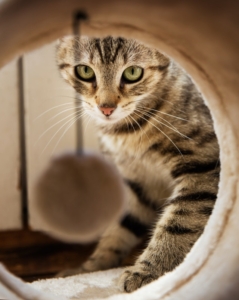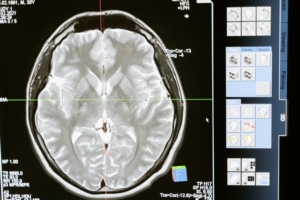Curiosity: You Are NOT the Cat
 My grandmother frequently admonished me throughout my early years by saying, “Curiosity killed the cat.” This reprimand usually coincided with actual or contemplated mischief, so I heard it a lot from my grandmother’s lips. She used the quip to keep me in line.
My grandmother frequently admonished me throughout my early years by saying, “Curiosity killed the cat.” This reprimand usually coincided with actual or contemplated mischief, so I heard it a lot from my grandmother’s lips. She used the quip to keep me in line.
I notice people stating this idiom to their children, to other adults, and to themselves. Clients will even say it to me as an excuse for not considering their range of possibilities. 
Repetition of phrases like this, said as statements of fact, causes us to internalize them. They become a guiding rule for our behavior, acting on us below the level of our conscious awareness. Adhering to the notion that curiosity killed the cat, therefore it will kill us, keeps us locked in our safety zone. When we stay locked in our safety zone, we sacrifice growth and development in exchange for the comfort of what we already know.
By doing this, we become vulnerable to the pitfalls of failing to exercise curiosity in a world teeming with places, things, and ideas to explore. We become susceptible to problems like:
- Group Think
- Functional Fixedness
- Stagnate Learning
- Decline in Neural Networks
- Poor Problem-Solving
- Failed Relationships
People caution others not to express curiosity as a subtle cue to not rock the boat, to walk the straight and narrow, to maintain the status quo. The message hints that if we ask questions such as, “How does this work?” or “What are my other options?” or “Why is this way the right way and that way the wrong way?” we will be ostracized from the in-group and cast into the out-group.
This conviction activates the limbic system within the brain, where emotions and the flight or fight response are governed. The brain’s sole purpose is to keep us alive. It operates on the prehistoric principle that to be kicked out of the clan means certain death by exposure to the  elements, illness, starvation, or predator. Your brain truly believes that curiosity killed the cat and that curiosity will kill you, as well. Thus, it creates a feeling of fear in order to discourage curiosity and regain a sense of safety.
elements, illness, starvation, or predator. Your brain truly believes that curiosity killed the cat and that curiosity will kill you, as well. Thus, it creates a feeling of fear in order to discourage curiosity and regain a sense of safety.
 I can 100% guarantee you that you are not the cat. In most cases, curiosity poses no hazards to you. In fact, it expands your worldview. It connects you in deeper and more meaningful ways to the people around you. It profoundly transforms your ability to overcome challenges. And it leads to greater creativity, happiness, and life satisfaction.
I can 100% guarantee you that you are not the cat. In most cases, curiosity poses no hazards to you. In fact, it expands your worldview. It connects you in deeper and more meaningful ways to the people around you. It profoundly transforms your ability to overcome challenges. And it leads to greater creativity, happiness, and life satisfaction.

Your brain is an incredible organ. Though charged with surveying the environment for danger and triggering a response to it, the brain can also be taught that what it once perceived as dangerous is not. It has this marvelous plasticity that allows it to change based on the environment and how you interact with the environment. By indulging in curiosity, even in small ways, you begin to mold your brain to not only embrace curiosity, but to crave it even more.
